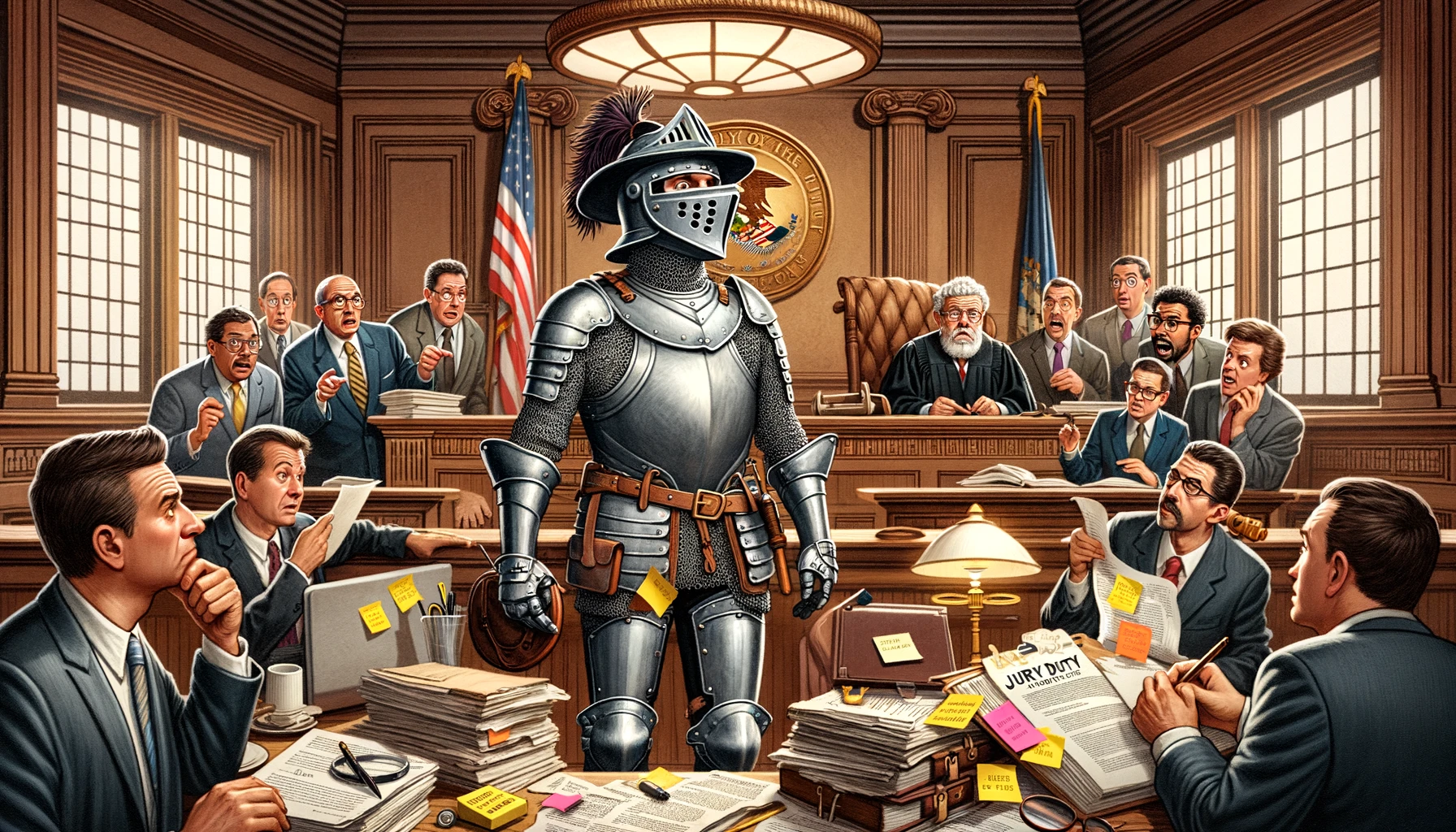Oh, glorious day! You’ve just received a summons in the mail, beckoning you to take part in the sacred civic ritual known as jury duty. Congratulations! You’ve hit the adulting jackpot. Now, while some might view this as an opportunity to serve their community and play a crucial role in the justice system, you, my friend, have other plans. And who could blame you? After all, who wouldn’t want to spend their days in a cramped room with strangers, listening to legal jargon, and deciding the fate of a fellow human being? Sounds like a blast, right?
Fear not, fellow jury-dodger, for I have compiled a treasure trove of (questionable) advice to guide you on your quest to freedom. But be warned: this journey requires a delicate balance of wit, audacity, and a flair for the dramatic. Are you ready to embark on this noble endeavor? Let’s dive in.
Understanding the System
Before you can successfully navigate the treacherous waters of jury duty avoidance, you must first understand the enemy.
What is Jury Duty, Anyway?
Jury duty is a form of service to your country, where you, the average Joe or Jane, get to play a vital role in the justice system. When you receive a jury summons, you’re being called to potentially serve on a jury in a legal case. This could range from a minor civil dispute to a major criminal trial. Exciting, right?
You’ll be asked to listen to the facts of the case, evaluate evidence, and work with your fellow jurors to reach a verdict. It’s like being on a real-life episode of “Law & Order,” except with less dramatic background music and more responsibility.
But Why Me?
Jury duty is random, kind of like a less fun version of winning the lottery. Names are usually pulled from voter registrations or driver’s license databases. So, if you’re a registered voter or have a driver’s license, congratulations, you’re in the pool!
The Consequences of Playing Hooky
Now, before you start practicing your “jury duty avoidance” dance, let’s talk consequences. Ignoring a jury summons can lead to some pretty serious repercussions. I’m talking fines, additional civic duties, or even a stern talking-to from a judge. And trust me, that’s one conversation you want to avoid.
In most jurisdictions, ignoring a jury summons is considered contempt of court, and judges tend to frown upon that. The exact penalties vary, but they can include fines ranging from $100 to $1,000, and in some cases, you might even be summoned to appear before the judge to explain yourself. If you thought jury duty was bad, this is worse.
Can I Actually Get Out of It Legally?
Now, for the moment you’ve been waiting for: Can you actually get out of jury duty? The answer is yes — but it has to be for a valid reason. Most courts will excuse you if you have a legitimate conflict, such as a pre-planned vacation, a medical condition, or significant financial hardship. The key is to communicate with the court and provide any necessary documentation to back up your claim.
Dodging Jury Duty
1. Perfect Your Excuse Arsenal
Now that you understand what you’re up against, it’s time to arm yourself with an arsenal of excuses. And not just any excuses – you need excuses that are bulletproof, yet subtle enough to not raise suspicion.
Consider the classics, like claiming you have a pre-paid vacation during the trial dates or citing work obligations that simply cannot be ignored. However, be cautious – these excuses are popular and may be met with skepticism.
Would serving on a jury cause you insurmountable hardship? Would it make your wallet weep and your soul shiver? Well, don’t keep that to yourself! Write a heartfelt letter, fill out the necessary paperwork, and let the court know just how devastating jury duty would be for you. Remember, a little drama goes a long way!
2. The Art of the Overshare
If your excuse game is strong, but you still find yourself called into the courthouse, fear not.
When it comes to getting out of jury duty, transparency is key. During the jury selection process, attorneys are on the lookout for any signs of bias or preconceived notions that might affect a fair trial. So, why not give them exactly what they’re afraid of? If they ask you a question, don’t just answer it — embellish it with an elaborate backstory, your personal opinions, and a sprinkle of dramatic flair. For example, if they ask about your views on law enforcement, you might say, “Oh, I absolutely adore the police! My uncle was a cop, my best friend is a detective, and I have a ‘Support Our Troops’ bumper sticker. I’m practically part of the force!” With this approach, you’ll be deemed too biased faster than you can say “objection.”
3. Develop a Sudden Interest in Legal Jargon
Lawyers love to speak in tongues — legal tongues, that is. If you want to make them think twice about selecting you, start throwing around legal terms like confetti. “Oh, yes, I’m quite familiar with the voir dire process, and I have strong opinions on the use of peremptory challenges. Did you know that the Batson v. Kentucky case in 1986 set a precedent for challenging discriminatory jury selection?” By the time you’re done, the attorneys will be scratching their heads, wondering if you’re a secret lawyer trying to infiltrate the jury.
4. The Old “I Can’t Be Impartial” Trick
This one’s a classic. If you want to get out of jury duty without breaking a sweat, simply tell them that you can’t be impartial. “I read about this case in the newspaper, and I’ve already made up my mind. Guilty as charged!” Or perhaps, “My second cousin went through something similar, and I just can’t be objective about it.” It’s like telling a magic word to make the responsibility disappear. Just be careful not to lay it on too thick, or they might catch on to your ruse.
5. Express Your Love for Law & Order (The TV Show, Not the Concept)
If you want to add a bit of humor to your escape plan, try professing your undying love for courtroom drama TV shows. “Oh, I never miss an episode of Law & Order: SVU! I’ve seen every season, and I consider myself an honorary member of the squad. Does that make me qualified to be a juror? Absolutely!” The lawyers might just laugh you out of the courtroom, and you’ll be free to binge-watch to your heart’s content.
6. Unleash Your Inner Conspiracy Theorist
Now, if you really want to make an impression and ensure that no lawyer in their right mind would want you on their jury, it’s time to break out the big guns: conspiracy theories. “Oh, this case is about a theft, you say? Well, I’ve done my research, and I’m pretty sure this is all a cover-up orchestrated by the Illuminati. And don’t even get me started on how the court system is just a puppet of the New World Order.” Watch as the lawyers’ eyes widen in disbelief and they make a mental note to strike you off the list immediately. Congratulations, you’ve just secured your ticket out of the jury box.
7. Play the “Overly Eager Juror”
Contrary to popular belief, acting overly enthusiastic about serving on a jury can also work in your favor. When the lawyers see someone who’s just a little too eager to be there, red flags go up. “Jury duty? Oh, I’ve been waiting for this moment my whole life! I even brought my own gavel, just in case.” Add a few high-fives and an impromptu happy dance, and the attorneys will be convinced that you’re not the “stable, impartial juror” they’re looking for.
8. The Classic “Medical Condition” Excuse
Now, I’m not suggesting you fake a serious illness — that would be unethical (not to mention, a terrible thing to fake). However, if you do have a legitimate medical condition that would make serving on a jury difficult, don’t be afraid to speak up. “I have a rare condition called ‘juryitis’; it’s a severe allergic reaction to legal proceedings. I could break out in hives any minute now.” Just make sure you have a doctor’s note to back up your claims, or you might find yourself in hotter water than you started.
9. Demonstrate Your Lack of Attention Span
In the digital age, attention spans are shorter than ever. Why not use that to your advantage? “Sorry, what was the question? I was just checking my Twitter feed. #JuryDutyBlues.” Show them that your focus is fleeting at best, and they’ll be sure to pass you over for someone a bit more… present.
Conclusion
While we’ve had our fun, it’s important to remember that serving on a jury is a vital part of the democratic process. It ensures that defendants receive a fair trial, and it gives citizens a voice in the legal system. So, while these strategies might give you a good chuckle, I encourage you to take your civic duties seriously when the time comes. After all, if everyone dodged jury duty, the system would crumble, and we’d be left with a justice system as reliable as a chocolate teapot. And who wants that?
Happy dodging, and may the odds be ever in your favor! (But seriously, do your civic duty when it’s truly needed.)
Note: This article is intended for entertainment purposes and should not be taken as legal advice. Civic duty is an important aspect of democratic societies, and participating in jury duty is a significant responsibility. Please consider participating in the jury duty process honestly and earnestly.
Pro Tips: Navigating Jury Duty Like a Champ
Tip 1: Be Informed
In all seriousness, knowledge is power when it comes to jury duty. Take the time to research and understand what jury duty entails in your jurisdiction. Knowing the process, the expectations, and your rights can go a long way in helping you navigate the situation more confidently and comfortably.
Tip 2: Communication is Key
If you genuinely have a valid reason for not being able to serve on a jury (such as a pre-planned trip, financial hardship, or personal circumstances), don’t be afraid to communicate this to the court officials. Courts are typically understanding of legitimate concerns and may be willing to defer your service to a later date or excuse you altogether.
Tip 3: Plan Ahead
Jury duty can be time-consuming, and the waiting around can be the hardest part. Bring a book, some work, or something else to keep yourself occupied during the downtime. Also, make sure to plan your commute and parking in advance to avoid any added stress on the day of.
Tip 4: Dress Comfortably
If you have been called, you’re in for a long day and you’ll want to be comfortable. Dress in layers to accommodate for varying room temperatures, and wear comfortable shoes in case you have to walk a distance or stand for extended periods of time.
Tip 5: Keep an Open Mind
Finally, try to keep an open mind about the experience. Serving on a jury is a significant civic responsibility, and it plays a crucial role in the justice system. While it may not be the most exciting way to spend your time, it can be an interesting and enlightening experience, giving you a firsthand look at how the legal system works.
FAQ: Everything You Wanted to Know About Jury Duty (But Were Afraid to Ask)
While the thought of serving on a jury might send shivers down your spine, it’s not the end of the world. In fact, many people find the experience to be quite interesting and rewarding. You get a front-row seat to the legal process, and you play a crucial role in upholding justice. Plus, you might even make a new friend or two along the way!
Ignoring a jury summons is not a good idea and can lead to some serious consequences, including fines or other penalties. The rules vary by jurisdiction, but it’s generally a much better idea to respond to the summons and communicate any conflicts or issues you have to the court.
Yes, jurors are typically compensated for their time, though the amount can vary widely depending on where you live. You may also receive reimbursement for travel and other expenses. However, it’s worth noting that the compensation may not fully cover lost wages if you have to take time off work.
In many places, employers are required by law to allow their employees time off to serve on a jury and cannot penalize them for doing so. However, the specifics can vary, so it’s a good idea to check the laws in your area and communicate with your employer as soon as you receive a jury summons.
Yes, there are several legitimate reasons you might be excused from jury duty, including financial hardship, personal obligations, or health issues. If you have a valid reason, be honest and communicate with the court officials — they are typically understanding and willing to work with you.
While it’s less common to volunteer for jury duty, some jurisdictions do allow it. If you’re interested in serving, you can contact your local court to inquire about the process.
Jury selection is a random process, and some people never get called to serve. If you’re really eager to participate, you can always look into other civic engagement opportunities in your community — it’s a great way to contribute and get involved!
Ah, the old myth that being too smart or too knowledgeable will get you kicked off a jury! While it’s true that lawyers are looking for jurors who can be impartial and open-minded, it’s not necessarily a matter of dismissing the “smartest” people in the room. Lawyers consider a variety of factors when making their decisions, including potential biases, life experiences, and how a juror might relate to the case. So, while flexing your intellectual muscles or pretending to be a legal expert might seem like a surefire way to get dismissed, it’s not a guarantee. Plus, do you really want to downplay your intelligence? Embrace your smarts – jury duty and all!
Absolutely! While we’ve had our fun poking at the quirks of jury duty, serving on a jury can indeed provide you with a unique and valuable perspective on the legal system. You’ll get to see firsthand how trials work, how decisions are made, and the importance of having a jury of one’s peers. It’s a chance to be a part of something bigger than yourself and to contribute to the pursuit of justice. So, while it might not be as thrilling as a courtroom drama on TV, it’s real life, it’s important, and it’s definitely an experience you won’t forget anytime soon.



